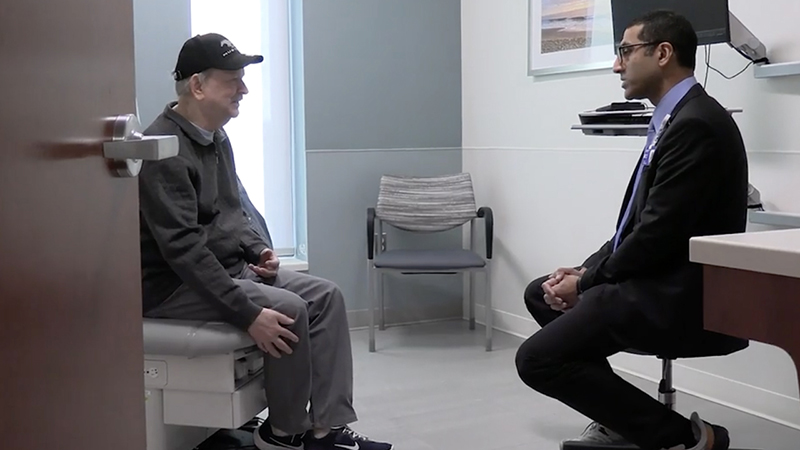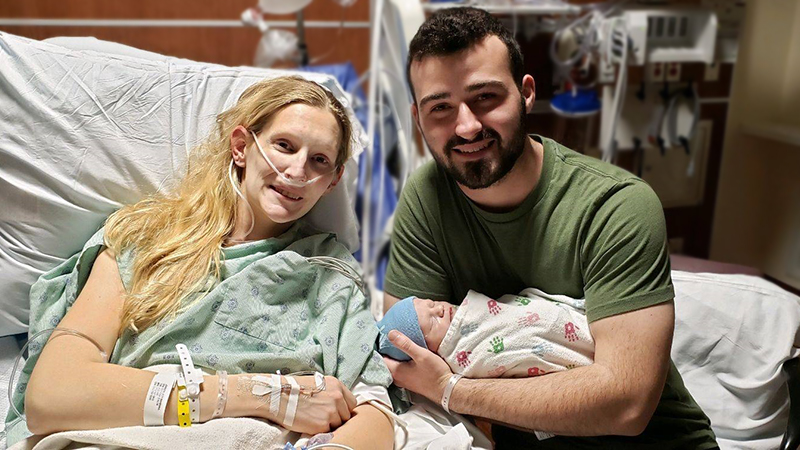Long COVID-19: Symptoms and Stories
Why Comprehensive Care Matters
Updated July 2023
They were never severely ill. They were never in the intensive care unit (ICU) or on ventilators. But, Linda Tomkow and Samantha Lewis are still dealing with the aftermath of having COVID-19.
They are among those who have post-COVID-19 conditions. Those who have chronic symptoms of COVID-19 are sometimes said to have long COVID, post-COVID-syndrome or post-acute sequelae of SARS-CoV-2 infection (PASC). Symptoms can last weeks, months or even years after initial COVID-19 infection. Long COVID-19 occurs in approximately one-third of COVID-19 survivors and, in 2022, was estimated to be the third leading neurologic disorder in the United States.
Stay persistent in advocating for yourself as a patient.— Samantha Lewis
“Due to widespread vaccination, rates of acute COVID-19 infection have decreased significantly. However, millions of patients are still experiencing persistent symptoms that may have occurred years ago,” says Marc A. Sala, MD, pulmonary and critical care specialist at Northwestern Medicine.
Common long COVID-19 symptoms include:
- Persistent fevers or fatigue
- Neurological symptoms, such as brain fog, headache, dizziness or insomnia
- Persistent cough or shortness of breath
- Cardiovascular conditions, such as inflammation of the heart (myocarditis) and irregular heartbeat (arrhythmia)
- Dysautonomia, a disorder of the autonomic nervous system that controls involuntary physical processes such as heart rate, breathing and bladder function
- Pulmonary embolism, deep vein thrombosis or other blood-clotting issues
- Kidney damage, which can lead to protein or blood in the urine
- Persistent nausea and diarrhea
- New prediabetes or diabetes
- New thyroid disorder
- Tinnitus, or ringing in the ears
- Blurred vision
- General decrease or loss of taste and smell
A Northwestern Medicine study found that more than 8 out of 10 people with long COVID-19 experience four or more neurologic symptoms that impact quality of life and cognitive abilities up to 15 months after having the disease.
Another Northwestern Medicine study that evaluated 1,802 patients with long COVID-19 found that:
- 85% of patients reported decreased quality of life
- 51% had cognitive impairment
- 45% had altered lung function
- 83% had abnormal CT chest scans
- 12% had elevated heart rate on rhythm monitoring
- Patients who had more severe COVID-19 infections were more likely to experience cognitive impairment and pulmonary dysfunction
Linda and Samantha were treated at the Northwestern Medicine Comprehensive COVID-19 Center, which brings together physicians and scientists from many medical specialties, from pulmonology to neurology, providing advanced treatment for chronic symptoms of COVID-19. The center is also advancing research in the field by studying the long-term impacts of the illness.
Like Linda and Samantha, 8 out of 10 patients at the Comprehensive COVID-19 Center were never hospitalized with COVID-19. More than 7 out of 10 of the clinic's patients are women, according to Igor J. Koralnik, MD, chief of Neuroinfectious Diseases and Global Neurology at Northwestern Medicine, who leads the clinic. Alongside Dr. Koralnik, Dr. Sala is the co-director of the clinic.
Linda's Story
In October 2020, at age 69, Chicago resident Linda Tomkow, 69, tested positive for COVID-19. Several weeks later, a chest X-ray showed she had pneumonia (fluid in the air sacs of the lungs caused by infection).
During Thanksgiving week of 2020, more heart tests were done, and Linda was referred to the Comprehensive COVID-19 Center.
In May 2021, Linda started cognitive rehabilitation. She learned she had mild scarring on her brain from COVID-19 that was causing brain fog.
Almost one year after learning she had COVID-19, Linda still had shortness of breath, caused by permanent mild scarring on her lungs; fatigue; brain fog; and low energy levels. She received care from a pulmonologist, neurologist, neuropsychologist, physiatrist, occupational therapist and physical therapist through the Comprehensive COVID-19 Center.
"It's the worst fatigue of your life," says Linda. "It's really been a team effort with my doctors to help me slowly get better."
Samantha's Story
Assisted living facilities were hit especially hard by the COVID-19 pandemic, and as director of a network of long-term care facilities for adults with long-term disabilities, Samantha Lewis, who is in her mid-thirties and lives in Aurora, Illinois, worked around the clock to help keep her staff and residents safe.
In October 2020, Samantha was exposed to COVID-19 at work and started to develop symptoms. She knew something was wrong when her cinnamon vanilla coffee tasted like metal.
After testing positive for COVID-19, Samantha isolated herself from her 11-year-old daughter and fiancé, and her symptoms continued to worsen: She had diarrhea, vomiting, cough and fatigue, and oxygen level readings on her pulse oximeter were dropping. While Samantha was becoming sicker, her responsibilities began looming larger. Her daughter, who has autism, was in remote school, so Samantha had to continue checking in on her schooling in the bedroom across the hallway to make sure that she was OK. Samantha was still trying to work remotely to keep the 32 group homes she managed afloat as COVID-19 outbreaks continued.
"In between naps, coughing spells and constant trips to the restroom, I was working remotely to organize grocery deliveries to residents who couldn't leave their homes and manage our staffing schedule, as the risk became greater for people to come into work," says Samantha.
By early November 2020, Samantha tried to return to work in person, but her body was overwhelmed. She was short of breath, fatigued and in pain. "Something was just not right," she says. Plus, she was noticing that she couldn't remember things at work that she once knew inside and out. Then, an incident in the kitchen changed everything.
'Something Weird Happened Today'
In mid-November 2020, Samantha felt dizzy and out of sorts. One moment, she was slowly unloading groceries in the kitchen with her daughter; the next moment, she woke up on the kitchen floor. Her daughter was crying and couldn't say how long Samantha had been unconscious.
Samantha had a hard time describing what happened to her. All she could tell her fiancé was "something weird happened today." She called her physician, who told her to go to the emergency department.
After this incident, Samantha had more tests and treatment over the next few months with neurologists, cardiologists and pulmonologists. She started vestibular therapy for her dizziness, but still couldn't get control of her erratic heartbeat and oxygen levels. Sometimes she would shake uncontrollably. She had to stop driving on the highway because she would either have to pull over to vomit, or she found that her reaction time was slow, posing danger to herself and others. She started having urinary and bowel symptoms, and needed to set an alarm to remind herself to urinate because her brain was not sending her signals when her bladder was full. She developed psoriatic arthritis and started losing her hair. She became reliant on smart speakers around her house to remind her about everything.
While the exact cause of long COVID-19 remains unknown, the Comprehensive COVID-19 Center helped Samantha finally make sense of all of the symptoms and sensations she had been experiencing for months. It also helped her make sense of all of her appointments with specialists in physical, occupational, cognitive and speech therapy; neurology; cardiology; gastroenterology; psychiatry; rheumatology; and pulmonology. The clinic coordinated her complex care, ensuring her physicians and therapists were communicating with each other.
"Some days are emotionally hard for me, but my advice to others dealing with chronic symptoms of COVID-19 would be to stay persistent no matter what. Stay persistent in protecting yourself and others by getting vaccinated, and stay persistent in advocating for yourself as a patient," says Samantha. "Stay persistent for the long road ahead."








